Advertisement
If Philippine tycoons are back in Duterte’s good books, what happened to ABS-CBN?
- After coming to power in 2016, Philippine President Rodrigo Duterte declared he wanted to ‘destroy the oligarchs that are embedded in government’
- He made peace with three tycoons who contributed to the Covid-19 fight, but sidelined the Lopez family – whose ABS-CBN network was forced off the air
Reading Time:6 minutes
Why you can trust SCMP

Philippine President Rodrigo Duterte has repeatedly and openly vowed to “destroy” wealthy and politically influential businessmen in the country.
So when he unexpectedly issued an apology to three wealthy tycoons last week after they contributed to the country’s coronavirus response, eyebrows were raised and observers questioned whether his crusade against the oligarchs was over, or if it was just a charade.
Despite having expressed his distaste for them in the past, Duterte mended fences with Manuel V. Pangilinan of the Metro Pacific Group and brothers Jaime Augusto Zobel de Ayala and Fernando Zobel de Ayala of the Ayala Group, who all donated money, medical equipment and services to the fight against Covid-19. But he ignored the contributions of the wealthy Lopez family altogether.
Advertisement

Indeed, the day after his apology, the sidelined family saw its ABS-CBN network shut down. As the lights went out for the broadcaster, which had a wider reach than the state-owned channel, Duterte’s spokesman said he had been instructed to thank the company for its efforts against the coronavirus.
Advertisement
Some observers said Duterte was just being opportunistic, trying to contain what he knew would be a backlash against ABS-CBN being forced off the air, and choosing not to alienate the businessmen who committed much-needed financial resources to the Covid-19 response.
But while tycoons who now seem to be in his good books have publicly accepted the president’s apology, influential businessmen like Rafael Ongpin do not believe this signals a change in Duterte’s views.
Advertisement
Select Voice
Select Speed
1.00x